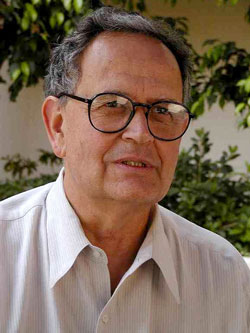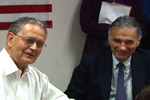In Memoriam: Remembering a ‘Dangerous
Man’
Peter
Miguel Camejo (1939-2008)
By Sharon Peterson
 BERKELEY - On November 23, 2008, an unseasonably sunny Sunday afternoon, over
400 family members, friends, colleagues and occasional opponents packed UC
Berkeley's International House auditorium.
BERKELEY - On November 23, 2008, an unseasonably sunny Sunday afternoon, over
400 family members, friends, colleagues and occasional opponents packed UC
Berkeley's International House auditorium.
They came to remember and celebrate
the life of activist, politician, financial manager and family man, Peter Miguel
Camejo, a man whom then-Gov. Ronald Reagan
called one of the "10 most dangerous men in California."
Camejo died from a recurrence of lymphoma on September 13, 2008, at the age
of 68.
It is deliciously ironic that Camejo would have been a UC Berkeley alumnus
had he not been expelled for "unauthorized use of a bullhorn" during
an anti-war demonstration in the 1960s.
Upon learning that his lymphoma had returned, Camejo asked Claudette
Begin to create and host his memorial. Begin and Camejo's wife, Morella Camejo, began
working together. Soon the team grew to include Camejo's brother, Dan Ratner,
Begin's husband, Alex Chis, longtime friend Carol Reed and Mike
Wyman, close
friend and veteran Green.
Claudette Begin opened the event, and served as host throughout. Peter Camejo's
family took the stage, then Morella Camejo and brother Antonio Camejo welcomed
the crowd and shared their personal memories. Dan Ratner produced a slideshow
of Peter Camejo's life, which played against the stage backdrop. Mementos from
political campaigns and copies of his books lined the back wall of the large
Spanish-style hall.
Morella Camejo said, "He couldn't stop coming up with ideas. His mind
was restless, forever making plans for the future."
Antonio Camejo said of his brother, "He firmly believed that we would
rally the American people around just causes."
Peter Camejo was perhaps best known for his runs for president on the Socialist
Workers Party, Green Party and independent tickets, and for Governor of California
on the Green Party ticket. In the 2003 gubernatorial recall election campaign,
Camejo's incisive remarks during the debates received national attention and
brought higher measures of visibility and respectability to progressive thought.
He was a friend of Malcolm X, and he marched in Selma with the Rev. Martin
Luther King, Jr. He was a pioneer advocate for immigrant rights and, after
9/11, worked for civil rights and freedom from hate for Muslim citizens.
Camejo wrote books on political activism, American and Californian history
(Racism, Revolution, Reaction, 1861-1877: the Rise and Fall of Radical econstruction
and California Under Corporate Rule) and socially responsible investing (The
SRI Advantage). He founded or co-founded progressive political action groups
such as the North Star Network (1983), the Progressive Alliance of Alameda
(1990s) and IDEA PAC (2005) and the Environmental Justice Fund (empowering
environmentalists of color), and he sparked growth in many others, such as
the Green Party.
During and after the Contra War in Nicaragua, Camejo helped promote fair trade
sesame farming in Nicaragua, which is now one of the world's largest of exporters
of sesame seed. In support of lesbian and gay rights, Peter created an IRA
to help fund the San Francisco Aids Foundation. Another venture was the Council
for Responsible Public Investment to assist the California Health Department's
anti-tobacco divestment work.
The family remembered the devoted husband, father and grandfather. Colleagues
remembered the financial planner who was obsessed with the stock market game,
but left lucrative positions at Merrill Lynch, and then Prudential to create
his own firm, Progressive Asset Management, because neither institution would
promote socially-responsible investing. Everyone remembered the quick wit of
a born comedian scholar.
Among the speakers were such progressive political luminaries as Ralph Nader
and his 2008 presidential running mate, former San Francisco Supervisor Matt
Gonzalez, Cindy Sheehan, who ran against Rep. Nancy Pelosi in 2008 and plans
to do so again in 2010, Donna Warren, Camejo's running mate in his 2002 and
2004 gubernatorial bids, Mayor Gayle McLaughlin of Richmond, and Jo
Chamberlain,
former candidate for State Assembly and Camejo's 2006 gubernatorial campaign
manager. Jason West, former Green mayor of New Paltz, NY and brand-new Bay
Area resident as of that day, was a surprise guest.
 Ralph Nader said that Camejo "always renewed himself. Some people learn
until they're about 30, and then run on fumes for 30 or 40 years.
Ralph Nader said that Camejo "always renewed himself. Some people learn
until they're about 30, and then run on fumes for 30 or 40 years.
Peter was always learning."
Dr. Agha Saeed, of the American Muslim Alliance, and Miguel Araujo, leader
of Centro Azteca, praised Camejo's civil rights advocacy and urged progressives
to keep on working.
Kalman Stein, CEO of the environmental charity organization EarthShare (Camejo
had been a boardmember) flew in from Washington, D.C. to share his memories.
Visibly moved by prior speakers, Stein observed that "it's a joy to find
out about all the parts of Peter I didn't know."
Mike Wyman, long time friend and Green
Attorney General candidate in 2006,
said Camejo will be most remembered as "a man of great passion and boundless
compassion for the poor, ininsured workers and for immigrant workers in their
struggle for justice and
legalization."
Peter Miguel Camejo was a first-generation American, born to Venezuelan parents
in the Borough of Queens in New York City.
Venezuelan Consul General Martin Sanchez read a statement from the Venezuelan
Ambassador, Bernardo Alvarez Herrera. Sanchez apologized for Herrera's absence,
noting that the Ambassador had recently been expelled from the United States.
In his final months, Camejo focused on writing his autobiography. He had barely
enough time to finish it.
His editor, Leslie Evans, reported that he is working on the final chapters
and that the book, with the working title, North Star, has been approved for
publication by Haymarket Publishing.
All who attended the memorial came away with the same knowledge of great loss
that brought them together.
But they also took with them a strengthened determination to continue Peter
Miguel Camejo's work.
(Suzanne Baker contributed to this story, which was largely adapted from
the Berkeley Daily Planet of November 26, 2008)

